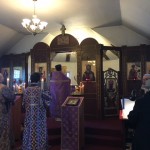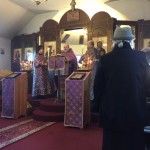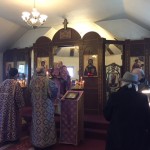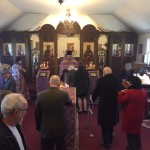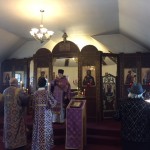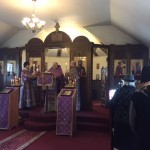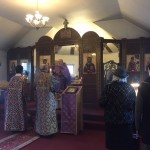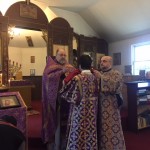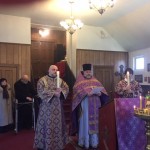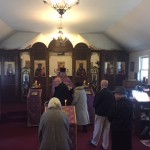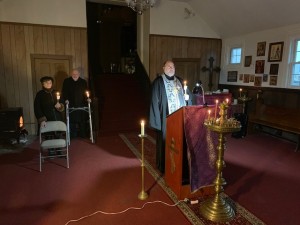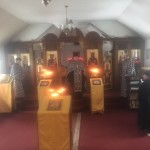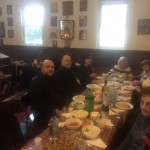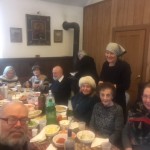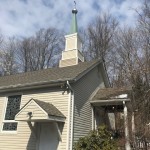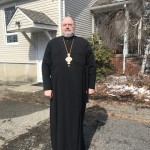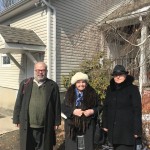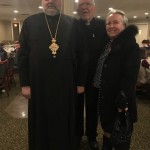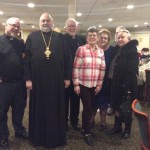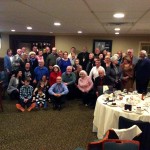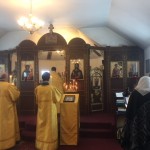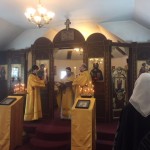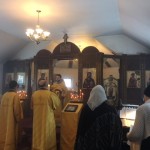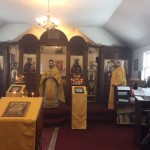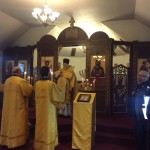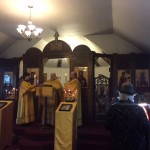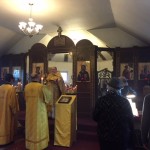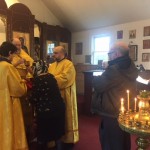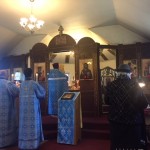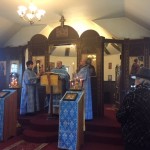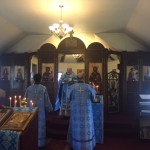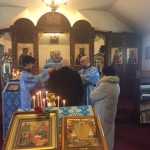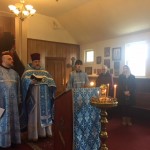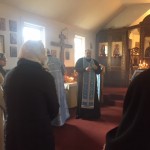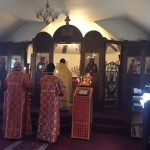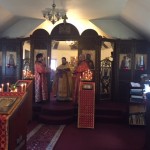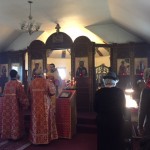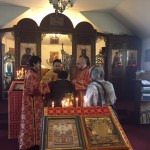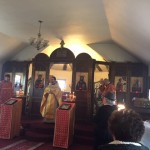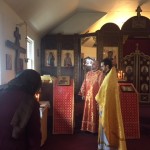On March 24, on the Second Sunday of Lent, St. George Parish family gathered for a nice celebration. Following the Hours the Divine Liturgy was served by our Rector, Archpriest Igor Tarasov. After the Gospel lesson he preached the following homily in English:
“On this Second Sunday of Lent the Church commemorates holy Father Gregory Palamas, Archbishop of Thessalonica, a great theologian and a spiritual writer who lived in the 14th century. Almost two years ago I had an opportunity to visit that glorious city of Thessalonica and venerate the relics of St. Gregory Palamas. His relics are kept in the main cathedral of the city dedicated to him, and St. Gregory is the second honored local Saint in Thessalonica after Holy Great Martyr Demetrius.”
“St. Gregory Palamas very much known for his teaching on so called divine energies, on the ways a man can acquire divine grace. Very often we forget about his teaching on human death. Today we should recall the ideas of St. Gregory on that. That great Archpastor of Thessalonica taught that only human body dies but human soul only passes from this world to another. Just like the body dies becoming separated from the soul, so the soul dies if becomes separated from God. Such death of the soul is a true death because in that way the soul becomes separated from God and united with the sin. St. Gregory taught that Christians should ask themselves whether their souls are dead or alive. If they are already dead, separated from God, we may still revive them; they can have a resurrection. It will occur if we truly repent, abandon our sin and unite with God. Repentance and forgiveness of our sins may resurrect our dead souls.”
“Today’s Gospel lesson is telling us about that important and so much saving process. A paralyzed man was brought to our Lord Jesus Christ. He was carried on his bed by four men. Jesus seeing their faith, said to the paralytic, “Son, your sins are forgiven you” (Mk. 2, 5). Little later Jesus also healed the paralytic. Thus, the Lord first forgave the sins of the sick man, then He made him whole. That tells us that the trouble with that man was not paralysis but something deeper. Body and soul live so close together that often the sickness of one affects the other. The torture of sin and guilt was the deeper cause of this man’s infirmity. So Jesus removed the primary cause saying that the sins of that man are forgiven.”
“If a person is a bad driver, he will ruin any car, even the best one. The best therapy in such a case is not the constant repairing of the car, but the re-education of the driver. If Jesus had healed only the body of the paralytic, the guilt of unforgiven sin would have found expression in some other physical ailment. This man was paralyzed by sin, and physical paralysis was only an outer manifestation of the inner spiritual infirmity. Sin is the greatest paralysis. It paralyzes man, body and soul. Our Lord Jesus Christ came to cure this paralysis.”
“Going back to our previous talk about spiritual death, as St. Gregory Palamas taught, we may see that the sin, being a paralysis, leads to death. A greatly sinful person is spiritually dying or already spiritually dead. Only our Lord Jesus Christ can heal him and bring him back to life. Only His divine grace, His uncreated energy can resurrect him. St. Gregory preaches to all of us, “Look into your souls, are they alive or dead? Christ is our life. Those who are removed from Christ abide in death, although they are alive in their body. Take care of your soul! Remember, there is only one life – this is life in God, and there is one death – this is alienation from God”.”
“In these days of Lent every Christian must check himself: is he alive or dead. If he died, let him remember that he can rise again here in earthly life, that is, to unite with God. Divine Providence is designed to resurrect human souls from death. The Holy Church, reminding us of the spiritual death, calls us: “Beware therefore, O my soul, lest you be weighed down by sleep, lest you be given over to death”. We believe that our soul is immortal, it does not die. But it can die spiritually: it can undergo eternal death when it will be condemned at the Last Judgment. About that kind of death the Church says when we sing that troparion about Christ the Bridegroom coming in the middle of the night. The Church sings in that hymn that if our soul will not be vigilant, we will be unworthy of the Kingdom of God and we will be given over to death, the spiritual and true death.”
“Dear brothers and sisters! Look into yourself, check your faith and your life. Try here on earth, before death, to reach the resurrection of your soul. Let us exclaim along with Holy Apostle, “Arise from the dead, and Christ will give you light” (Eph. 5, 14).”
The choir prayerfully performed hymns to St. Gregory Palamas during preparation for Holy Communion.
After the dismissal of the Liturgy the Rector preached a short sermon in Russian addressing the ideas of his English homily. He also made an announcement that on Sunday, April 7, on the feast of the Annunciation we expect the multiple relics to be brought to our church. Among them the relics of Holy Great Martyr George, our parish Patron, as well as of St. Nicholas the Wonderworker and St. Spyridon.

